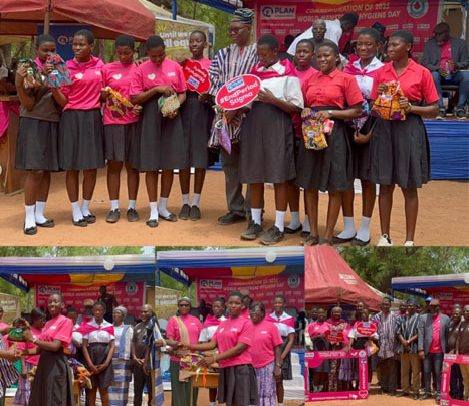Scenes from the event
Plan International Ghana, has commemorated this year’s World Menstrual Health and Hygiene Day under the “Period Friendly Ghana” at the Walewale Senior High/Technical School in the North East Region.
Plan International Ghana Country Director, Mr. Constant Tchona, at the commemoration ceremony noted that menstruation is not a choice but a natural, healthy part of life.
He disclosed that available data show that most schools in Ghana lack basic facilities for menstrual hygiene management—such as changing spaces, running water, disposal systems, and menstrual products.
“For many young girls, menstruation remains a challenge, forcing them into seclusion, restricting their mobility, and even keeping them out of school. Cultural norms often prevent girls from participating in daily activities, including education. In fact, inadequate WASH facilities in schools remain a key driver of girls dropping out,” he stated.
Mr. Tchona indicated that Plan International Ghana has long championed programmes and projects like SHE Leads, Youth Empowered to Thrive, Be Smart, Learn and Stay Protected, and Integrated Package for Sustainable Community Development (IPADEV).
“Plan International Ghana has advocated for tax removal on sanitary pads, distributed disposable and reusable pads to over 150,000 girls, pushed for standards in reusable pad certification, trained women to produce reusable pads, provided menstrual health education, engaged men and boys as allies, supported visually impaired girls in lobbying for WASH facilities, launched Pad Banks in schools and universities, built 100+ girl-friendly latrines, as well as installed water facilities in schools and communities among others,” he disclosed.
He assured of Plan International Ghana’s commitment to collaborating with the government and communities to advance menstrual equity and gender equality.
“We cannot achieve equality if periods are treated as problems. We cannot build a thriving Ghana if menstruation pushes girls to the margins,” he pointed out.
Plan International Ghana also distributed 1,000 reusable sanitary pads to students of the Walewale Senior High/Technical School.
The North East Regional Minister, Ibrahim Tia, commended Plan International Ghana for their unwavering commitment to the development of communities, particularly in the West Mamprusi Municipality, adding that their interventions under the Integrated Package for Sustainable Development (IPADEV) project are exemplary and deeply impactful.
According to him, poor menstrual hygiene management continues to pose serious challenges for adolescent girls in various schools, adding that many are forced to miss school due to inadequate facilities, stigma, and limited access to menstrual products.
“This contributes to gender disparity in education and undermines the future of our region,” he added.
He stated that the visionary Free Sanitary Pad Distribution Policy recently introduced by President John Dramani Mahama will go a long way to reduce the financial burden on parents, and increase school attendance among girls.
Headmaster of Walewale Senior High/Technical School, Revered Ibrahim Sebiyam, appealed to Plan International Ghana to provide a female-friendly KVIP toilet facility, changing rooms and potable water for the girls in the school, to tackle challenges and to promote menstrual health hygiene.
“Our girls are struggling because their toilet facilities are either in a deplorable state, dysfunctional as a result of inadequate water, or abandoned,” he stated.
FROM Eric Kombat, Walewale


